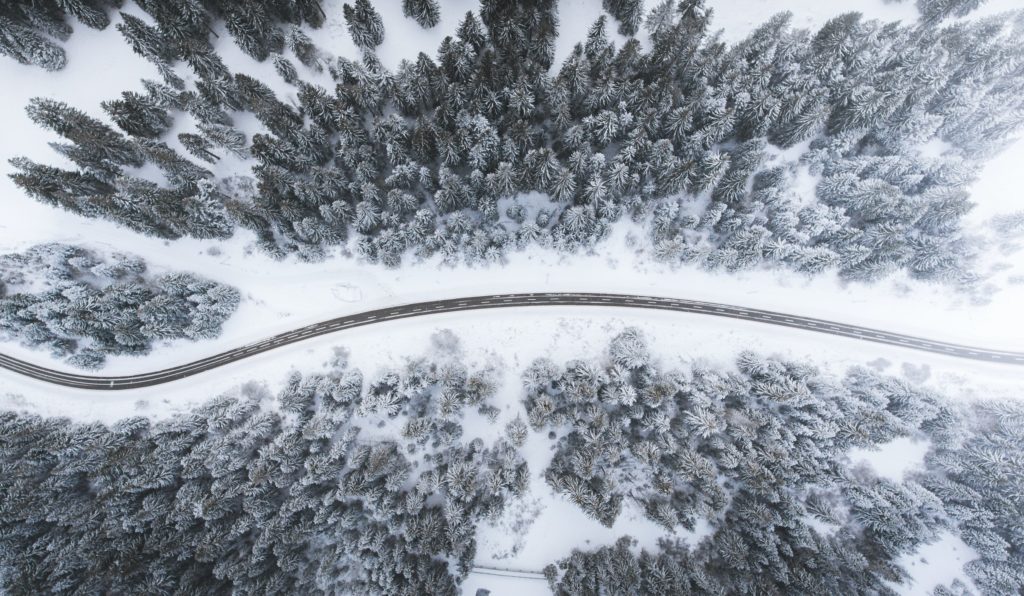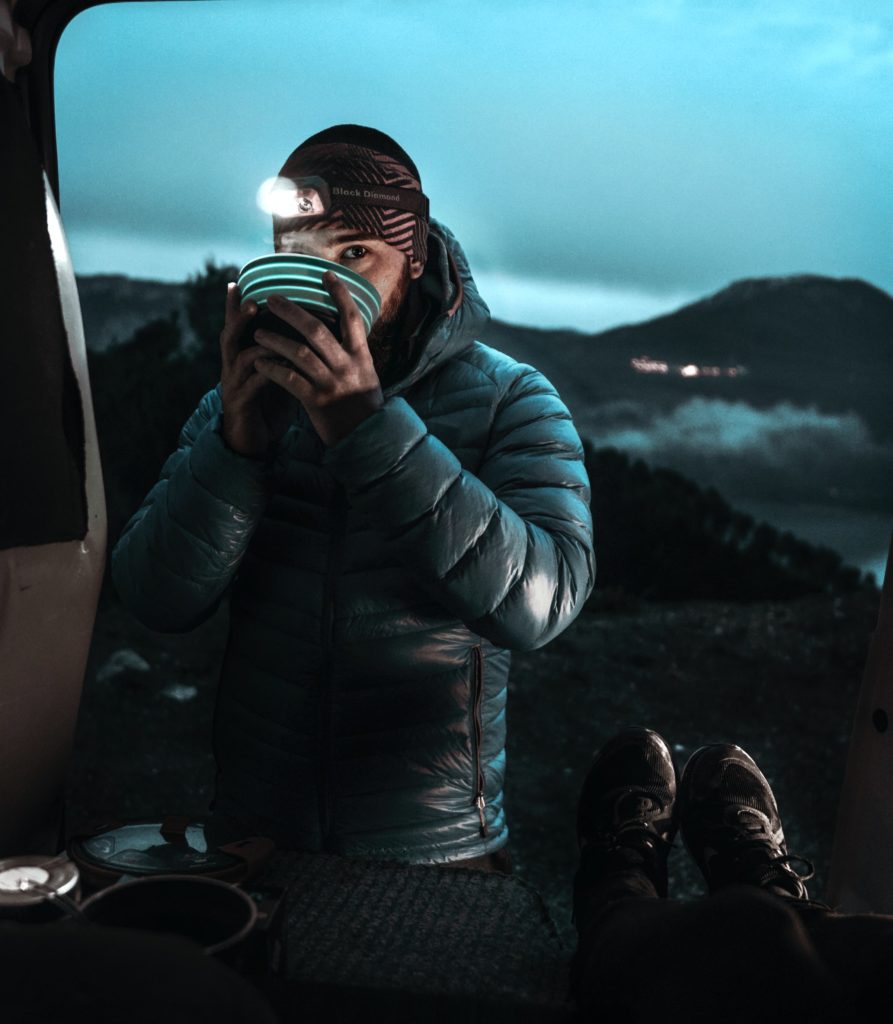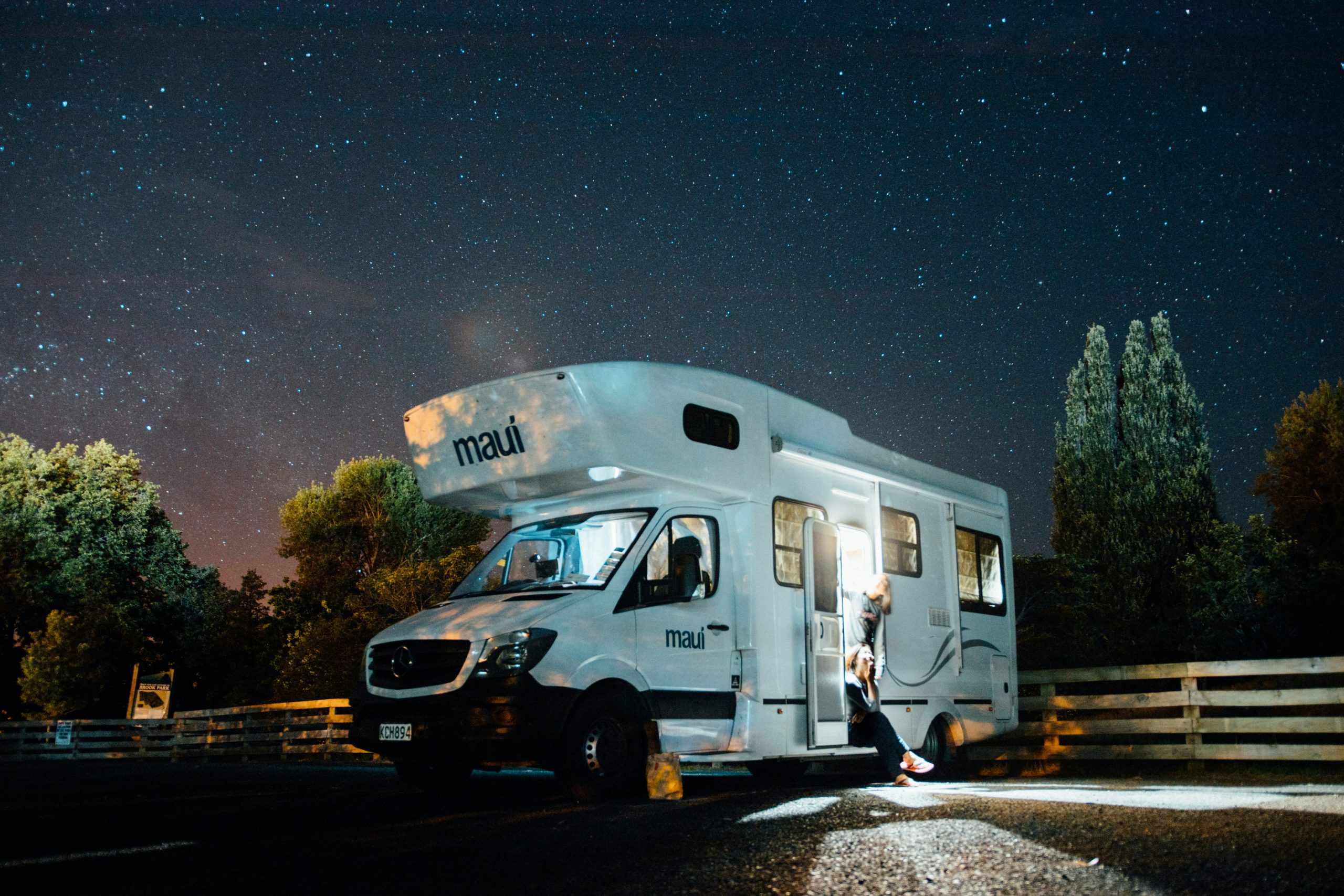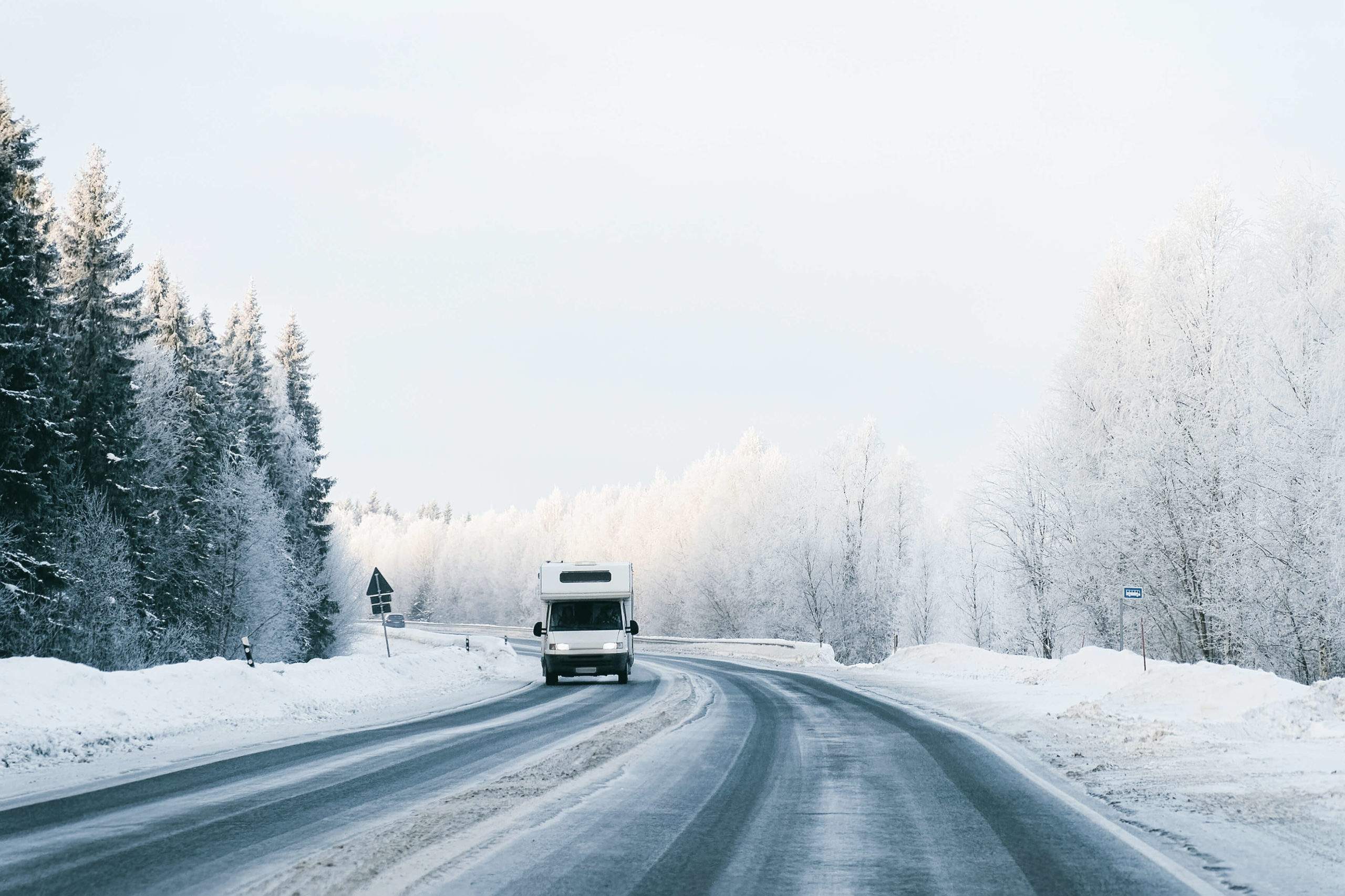Can you live in a camper in the winter? In short, yes. When the mercury drops, many full-time RVers head for greener — and sunnier — pastures down south. And while chasing 70 is appealing, it also means that you’ll be missing out on activities like skiing, snowshoeing, hot cocoa, and other things that make winter fun. It seems logical to point an RV south for the winter, but — if you follow the right game plan — living full-time in an RV in winter can be both feasible and fun.
The key lies in following the right set of tips and living in the right types of rigs so you can experience some truly spectacular winter living. Living full-time in an RV in the winter also means that you’ll need to have your rig prepped for winter roads, pack the right kind of stuff, and be ready to winter-prep your RV at every campground you hit.
RVs For Rent Near You

This article is a step-by-step guide to follow for comfy RV living in the winter.
Is Living in a Camper in the Winter Right for You?
Living in a camper in the winter involves careful planning and consideration on your part. The following tips and considerations will help you to decide if full-time winter is right for you.
RV Living Considerations in Winter
Is your RV winter-ready?
Investigate your RV’s winter readiness. RV manufacturers build RVs with different insulation levels and weather ratings. Generally speaking, you should have an RV described as four-season to most easily venture into winter RVing.
When in doubt, your owner’s manual or dealer should be able to tell you how winter-resistant your RV will be.
What are your winter limitations?
Understand the limitations of RV living in winter. Even if your RV is a heavily insulated, four-season camper, it will still have less cold weather protection than your house. This can mean constantly fighting with old man Winter as he tries to freeze your pipes, frost over your sewer hose, and get his cold paws around your rig.
Bearing that in mind, it’s generally advisable to pursue living in a camper in the winter only if that gets you near a fun place like a ski hill, snowshoeing trails, etc. Otherwise, it might not be worth the effort!
Can your tow vehicle or motorhome handle winter roads?
Make sure your tow vehicle or motorhome can handle it. If you have a 2×4 truck or a less-than-rugged motorhome, you may want to reconsider living in an RV full-time in the winter.
Are your tanks heated?
While not a requirement, having heated black, gray, and freshwater tanks will help your rig withstand the frost. See your owner’s manual for reference on this.
Are you willing to winterize your RV every time you get to a campground?
If you plan to be on the move a great deal, every new campsite will mean doing things like skirting your RV, heat taping your pipes, filling up on propane, unfreezing your sewer hose, etc.
We’ll take you through the step-by-step process to winterize your camper at a campground in a moment, but your first step is to decide if you’re okay with that effort.
Choosing the Right Campsite for Winter RV Living
Selecting an appropriate campsite can significantly impact your winter RV experience:
- Year-Round Campgrounds: Ensure the campground operates during winter months and offers necessary amenities.
- Electric Hookups: Access to reliable electricity is vital for heating and powering essential appliances.
- Proximity to Services: Being close to grocery stores, propane suppliers, and medical facilities adds convenience.
- Snow Removal Services: Campgrounds that offer snow plowing can save you time and effort.
12 Tips for RVing in the Winter

You’ve made the decision to live in your RV for the winter. Here are the tips you’ll want to follow:
1. Invest in a generator (if you don’t already have one)
Power can be unpredictable in the winter. If you don’t already have a generator for your RV, snag one before you embark on living in a camper for the winter.
2. Check if your RV windows are dual pane
Dual pane windows are much better at keeping out the cold than single pane. If you don’t have them, you’ll want to invest in window insulation film to better insulate your windows.
3. Use a heated RV hose
Heated RV hoses will keep the water flowing as you RV during the winter. Be sure to find one that’s well-rated for the cold temps you plan to venture into!
4. Invest in an efficient space heater
Chances are, your propane heater alone will not be enough to keep up with RV living in winter. That’s why you’ll want to grab a space heater to help supplement winter RV living. NOTE: Space heaters generally pull a lot of power. If your RV runs on 30 amps of power, you may only be able to run one space heater. Check your owner’s manual for further details.
5. Camp in established campsites
Unless you’re a true outdoor warrior with the gear and rig to match, it pays to camp in the more established spots that’ll take care of snow plowing and such for you.
6. Plan to purchase a lot of propane
Even if your RV has a heat pump and you’ve purchased a space heater, your RV’s onboard propane heater will likely be the most efficient way to heat your camper in the winter. That means you’re going to use far more propane than you may be used to.
7. Skirt your RV’s underbelly
A winterized camper isn’t complete unless you prevent cold air from getting underneath it. Cold air blowing under an RV is the #1 reason RV living in winter can be a challenge. We’ll talk about ways to skirt your RV momentarily.
8. Invest in heat tape
Heat tape can be wrapped around pipes in exposed areas to keep them from freezing.
9. Pack the proper gear
We’ll share a full packing list later, but things like heavy blankets, coats, and thermal undergarments will be key to successful winter RV living.
10. Seal roof fans
Roof fans in your RV can let in a great deal of cool air. Insulate your camper for winter use by using a vent insulator like this one.
11. Carry extra water
Despite your best efforts, old man winter might freeze up the water right at the source in your campsite. Wells can freeze over and city water connections can slush up. That’s why it’s always a good idea to carry at least 5 extra gallons of water with you in your rig in addition to what’s in your freshwater tank.
12. Mind your batteries
You can wreck your RV’s batteries if they constantly get frozen while you’re RVing in the winter. Be sure your batteries are well protected from freezing while winter camping.
How to Prep Your RV for Winter Roads

When setting out on an RV journey that involves winter roads, you’ll want to take a few important preparatory steps:
- Be sure you have ample supplies of food, water, and blankets in your RV. This will be vital in case you get snowed in or have to stop on the side of the road for an extended period of time.
- Ensure all your tires are winter ready and are in good condition. Tires are the single most important thing to keep you driving safely in the winter. Depending on where you head, you might even investigate specialized snow tires for your rig.
- Invest in a set of tire chains for your rig. These are often required on certain mountain passes — especially when winter RVing!
- Test your batteries before leaving to ensure they’re in excellent working order.
- Know your RV’s limitations — Motorized RVs are almost always rear wheel drive meaning they’ll be more prone to fishtailing on icy roads. Always plan ahead, drive slowly and carefully, and don’t be afraid to postpone or redirect a winter RVing trip if road conditions look too severe.
How to Prepare Your RV for Winter
Living full-time in an RV in winter hinges on your ability to prepare your RV for cold weather. Follow these steps to winterize your rig when you arrive at your destination.
Only open your black and gray tanks when full
At most campsites, you likely leave your gray tank open so water drains out. While RVing in the winter, this can lead to your sewer hose freezing up. Prevent this by only draining your tanks when they’re full and then promptly closing the tanks back up.
Use a hose ladder for your RV sewer hose
Sewer hose ladders will keep your sewer hose from bunching up so drain water can flow quickly down the chute.
Your biggest enemy while living in an RV in the winter is frozen water. By using a hose ladder, you’ll keep your poo from freezing in that hose.
Skirt your RV
RV skirts wrap around your RV to insulate the underbelly. Protecting your underbelly from cold winds is one of the most important ways to comfortably live in an RV in the winter.
Insulate your windows
To insulate your windows when you live full-time in an RV for the winter, grab some foil bubble or foam insulation, cut it to fit your windows, and then wrap it in nice-looking fabric.
This simple solution makes your windows look stylish and will go a long way to keeping you warm while winter camping.
Plug in your heated hose or only use your onboard water tank
Your city water connection will be the first thing to freeze while winter RVing if you aren’t using a heated hose. Alternatively, you can leave your water unhooked and rely on your onboard freshwater tank. Because your onboard tanks are insulated, they’ll stand up to the cold much better than an exposed hose.
Use heat tape on any exposed pipes
If you have external compartments where you see water pipes potentially exposed to the elements, you can wrap them in heat tape to keep water flowing.
Keep the heat running
While winter RVing, it’s imperative that you always leave some level of heat on in your RV to help keep things from freezing over. It is also more efficient to keep an RV at a base temperature in the winter than it is to constantly be warming it up from totally cooled off.
Radiant space heaters are a great way to maintain RV temperature while winter camping.
What to Keep in Your RV to Survive the Winter
RV living in winter depends on the right packing list. While it is important to prep your RV’s exterior in the right ways, it’s equally important that you and your family have the right gear for the cold.

- Thermal sleeping bags and/or thick duvets along with an ample supply of blankets will keep your crew happy and toasty while winter camping.
- Thick socks, thermal underwear, waterproof jackets and boots, and even snow bibs are all things that no winter RVer should be without.
- Layers, layers, and more layers. If you’re living full-time in an RV in the winter, you’ll often alternate from being outside in the cold to the warmth of your rig. By dressing in layers, you can quickly adapt to your surroundings.
- Headlamps and flashlights are important backups because winter camping generally increases the likelihood of power loss.
And last but not least, hot cocoa — be sure you have lots of that!
What are the Best Camper Brands for Living Full Time in the Winter?
The majority of RV brands will build models that are four-season. Generally speaking, that means you can go to a dealer of most any brand and ask them for their best winter-ready campers.
That said, here are a few examples of some of the best-known winter-ready RVs:
- Keystone Montana — Luxury fifth-wheels designed to take the worst that father winter has to offer.
- Arctic Fox — As the name implies, this entire lineup is ready for RV living in winter.
- Heartland Bighorn Fifth-Wheels — These large fifth-wheels offer a heated underbelly, heated tanks, and a variety of other amenities to keep you toasty while RVing in the winter.
- Oliver Trailers — Thanks to their double hull shell with an air gap and insulation between, these hip little fiberglass trailers keep warmth in just like a double sided insulated coffee mug.
- Forest River Sunseeker Motorhomes — These motorhomes offer the Arctic Package which will add things like dual pane windows, extra insulation, and heated tanks that’ll make winter RVing a breeze for you.
The Best Destinations for Embracing With in Your RV
If you want to embrace the magic of winter while RVing, there are plenty of destinations where you can enjoy snowy landscapes, winter sports, and cozy vibes. Here are some of the best options for experiencing winter weather in your RV.
Rocky Mountains
Colorado
- Breckenridge: Gorgeous mountain scenery and access to skiing, snowboarding, and snowshoeing. Several RV parks cater to winter travelers.
- Durango: Enjoy winter sports and ride the scenic Durango & Silverton Narrow Gauge Railroad through snowy landscapes.
- Estes Park: Gateway to Rocky Mountain National Park, with opportunities for wildlife spotting and snow-filled hikes.
Utah
- Park City: A top destination for skiing and snowboarding with winter-friendly RV parks nearby.
- Bryce Canyon National Park: Experience the stunning red rock formations dusted with snow.
Pacific Northwest
Washington
- Leavenworth: A charming Bavarian-style village with a magical winter atmosphere and plenty of snowy activities.
- Mt. Rainier National Park: Stunning winter vistas and opportunities for snowshoeing or cross-country skiing.
Oregon
- Bend: A winter wonderland with access to skiing at Mount Bachelor and plenty of craft breweries to warm up after.
Northern Plains
Montana
- Yellowstone National Park (North Entrance): Witness the park’s geysers and wildlife in a quiet, snowy setting.
- Whitefish: A fantastic base for skiing and exploring Glacier National Park in winter.
South Dakota
- Black Hills: Discover snow-covered forests, wildlife, and winter trails in this beautiful area.
New England
Vermont
- Stowe: A quintessential New England ski town with charming scenery and excellent winter activities.
- Killington: A hub for skiing and snowboarding enthusiasts with scenic mountain views.
New Hampshire
- White Mountains: Enjoy snowmobiling, ice climbing, or the breathtaking views of Mount Washington in winter.
Alaska
- Fairbanks: For adventurous RVers, experience the northern lights, dog sledding, and arctic beauty in the heart of winter. (Requires serious winterizing of your RV!)
Midwest
Michigan
- Upper Peninsula: Snowmobile trails, frozen waterfalls, and Lake Superior views make this area a winter paradise.
Wisconsin
- Door County: A peaceful, snowy retreat with winter hiking and cozy small-town vibes.
The Best Destinations to Escape Winter Weather in Your RV
Escaping winter weather in your RV is a great way to enjoy milder climates and stay comfortable. Here are some top destinations across the U.S. to consider.
Southwest
Arizona
- Quartzsite: A haven for RVers with warm temperatures, sprawling desert landscapes, and lots of RV facilities.
- Tucson: Offers stunning desert scenery, mild winter weather, and plenty of outdoor activities like hiking and birdwatching.
- Yuma: Known for its sunshine and RV parks catering to snowbirds.
New Mexico
- Las Cruces: Warm winters, a vibrant arts scene, and outdoor activities like exploring the Organ Mountains.
Southern California
- Palm Springs and Coachella Valley: Enjoy sunny days, upscale amenities, and access to Joshua Tree National Park.
- San Diego: Perfect coastal weather year-round, with beautiful beaches and RV parks near the ocean.
Gulf Coast
Texas
- South Padre Island: A tropical vibe with beachside RV parks and warm winter weather.
- Corpus Christi: Offers coastal breezes, fishing, and outdoor recreation.
Louisiana
- New Orleans: While not hot, it has mild winters and a vibrant culture, plus unique campgrounds.
Florida
- Keys (Key Largo to Key West): Escape to tropical paradise with warm waters, fishing, and world-class sunsets.
- Tampa/St. Petersburg: A mix of beaches, cultural attractions, and mild winters.
- Naples/Fort Myers: Gulf Coast beauty with upscale RV resorts and nature preserves.
Southeast
South Carolina
- Hilton Head Island: Beautiful beaches and mild temperatures.
Georgia
- Savannah: Historic charm with mild winters and nearby coastal camping options.
Winter RVing FAQ
Here’s a comprehensive Winter RVing FAQ to help you prepare for and enjoy winter adventures in your RV.
Can I use my RV in winter weather?
Yes, but it depends on how well your RV is winterized. Many RVs, especially four-season models, are designed for cold weather, but all RVs can be prepped to handle freezing temperatures with proper planning.
What is winterizing, and do I need to do it if I’m using the RV?
Winterizing involves preparing your RV for freezing temperatures to prevent damage:
- For storage: Drain water lines, add RV antifreeze, and protect the plumbing system.
- For use: Insulate pipes, tanks, and windows, and ensure your heating system is reliable.
How do I prevent my pipes from freezing?
- Use heat tape or heated water hoses for external connections.
- Keep cabinet doors open near plumbing to allow warm air to circulate.
- Use RV antifreeze in holding tanks.
- Run a trickle of water through faucets to prevent freezing in extreme cold.
What should I do about condensation in winter?
Condensation is common in cold weather due to indoor heating:
- Use a dehumidifier or moisture-absorbing products.
- Crack a window slightly to improve ventilation.
- Wipe down windows and walls where moisture collects.
How do I handle snow and ice buildup on my RV?
- Roof: Clear snow off the roof regularly to prevent damage and leaks. Use a soft, non-scratching roof rake.
- Steps: Keep them free of ice with salt alternatives like sand or pet-safe ice melt.
- Slides: Avoid extending slides in heavy snow conditions unless they are properly insulated and sealed.
Can I camp at RV parks in winter?
Yes, but not all parks stay open year-round. Check for:
- Open dump stations and water hookups.
- Heated or insulated facilities.
- Access to plowed roads and parking areas.
Are there any fun winter activities for RVers?
Absolutely! Depending on your location, you can enjoy:
- Skiing, snowboarding, and tubing.
- Snowshoeing and hiking.
- Ice fishing and snowmobiling.
- Cozying up inside with hot cocoa and winter views!
Are You Winter-Ready?
Living full-time in an RV in the winter can be a very fun adventure that’ll get you into parts unknown. You could live the dream parked by a ski hill, experience snowshoe trails right out your front door, or simply hibernate in a cute winter town. But before you embark on RV living in the winter, be sure to follow the steps above to prepare for the journey and prep your rig when you reach your winter camping destination.
And if you’re not using your RV in the winter, make sure to list on Outdoorsy!








